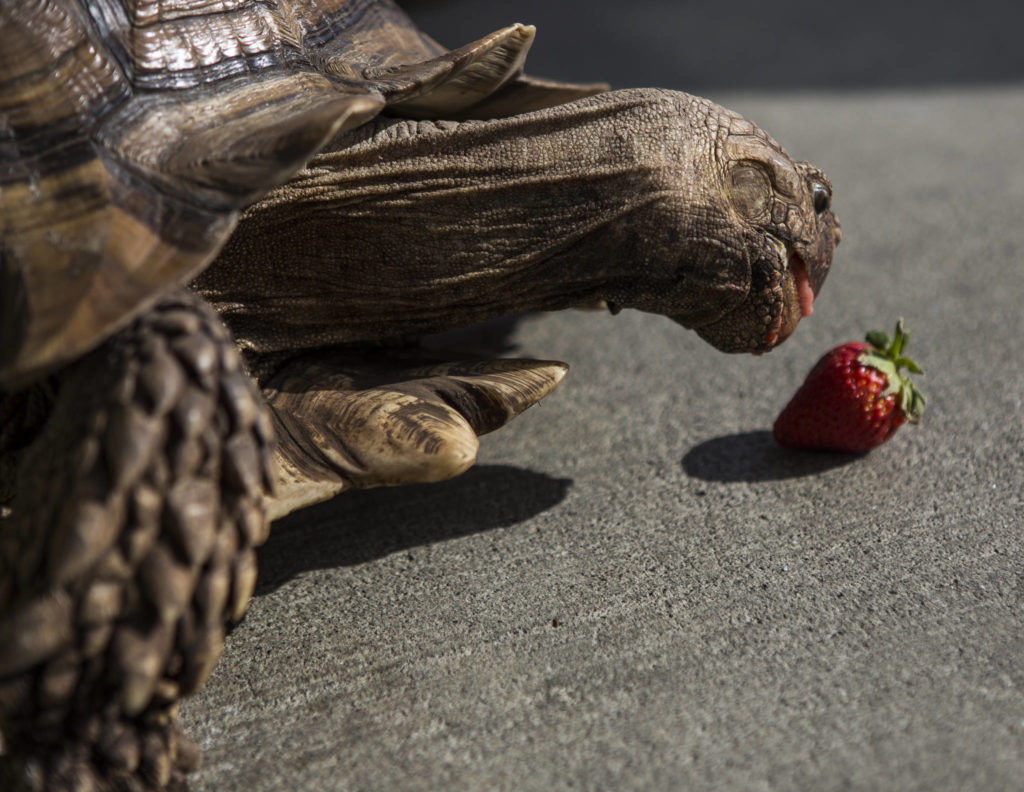Life at the Ken’s Korner shopping plaza in Clinton has come to a crawl for Raja, a 9-year-old tortoise.
There are less feet on the sidewalk on his afternoon strolls. Fewer hands feed him strawberries.
What’s up with that?
The 45-pound sulcata tortoise lives at Critters & Company Pet Center, an essential business in the pandemic scheme of things.
It’s next to Jim’s Hardware and two doors down from Pickles Deli, both deemed essential, as is the Red Apple Market anchoring the Whidbey Island plaza on Highway 525 north of Clinton. But Whidbey Arms gun shop, Good Cheer Thrift Store and other mainstays are closed.
Critters owner Debbie Wilkie reduced the hours at what was a full-service pet center and turned off the free popcorn machine next to the mouthy macaw that greeted customers with a squawk. She is struggling to stay open.
The saving grace: curbside pickups and free delivery, mostly of dog food and cat litter. Chains such as Petco and PetSmart also offer pickup options.
“We’re just trying to make it work,” Wilkie said. “Animals make people happy during this time.”
She has hundreds of mouths to feed in this domicile of birds, fish, reptiles and guinea pigs. Most are for adoption. But not Raja or Gus, a 27-year-old macaw.
It’s part pet-supply store, part rescue center, part zoo. A place where parents would bring kids to see Raja, Gus, snakes and rabbits, while spilling popcorn kernels on the floor.
The grooming service inside the store is suspended due to state orders, Wilkie said. While pet groomers are not on the list of essential workers, some have continued to operate mobile salons. Veterinary health care offices remain open.
“There are going to be some long nails and hairy dogs when this is over,” Wilkie said.
Tortoises are dry land creatures. Raja doesn’t like baths. Every few days he gets sprayed with water and coconut oil rubbed on his humped shell.
The pigeon-toed reptile with a dinosaur snout has the run of the place but his favorite spot is by the door, his exit for afternoon walks.
“He pushes the door open and gets out. He’ll stay out for hours, walking up and down the sidewalk,” Wilkie said.
A worker or volunteer at the store would accompany him on the slow-moving strolls.
There are less Raja-walkers now and not as many admirers. The boy tortoise has a fan club. He’s a dreamboat with beady eyes.
But those who come to Ken’s Korner these days have other things to do than bring Raja strawberries from the supermarket.
It’s not like Raja is underfed.
He eats actual salads with fruits and vegetables.
He’s 45 pounds and might someday weigh 200.
The tortoise could get that big when he reaches manhood, whenever that is. He is wired to live to be over 100 or even 150. A tortoise named Harriet collected by Charles Darwin during his 1835 visit to the Galápagos Islands lived to be about 175 years.
Harriet was thought to be male for many years and was actually named Harry.
Raja’s gender was a bit of surprise to Wilkie.
He was brought to the shop a year ago by a customer whose daughter went off to college. It was her pet, and not one her parents were willing to take on.
“They said it was a girl but it’s actually a boy,” Wilkie said. “A customer came over and said, ‘There’s something wrong with your tortoise.’… He’s a full-on boy.”
His age is guesstimated by size and rings.
Tortoises and other turtles are an ancient group of reptiles, going back millions of years. They’ve been dubbed “hard dogs” when it comes to petting them.
“It’s like touching the top of your fingernails,” Wilkie said.
The cold-blooded species requires attention and TLC that isn’t reciprocated by a warm nose or friendly paw.
A New York Times writer put it this way: “Loving a turtle means pouring endless amounts of affection into a bucket that will never fill because it has a hole cut in its bottom.”
Wilkie said eventually she will have to make a place for Raja at her home and figure out a way to transport him to the store. Her daughter, Melody, 17, will inherit the task and the tortoise.
“He’s smart,” Wilkie said. “He knows who you are.”
Around the store, Raja calls the shots.
“He doesn’t move for you, you move for him,” Wilkie said. “He likes to sleep in the fish room because it’s dark.”
Mostly, he’s by the door, people-watching.
“People think he’s just a wood doorstop, until he kind of turns his head and then they freak out because he moved,” she said.
Andrea Brown: abrown@heraldnet.com; 425-339-3443. Twitter @reporterbrown.
Talk to us
> Give us your news tips.
> Send us a letter to the editor.
> More Herald contact information.































